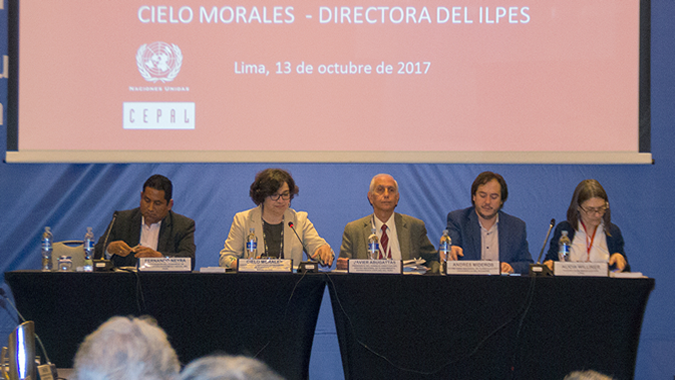ECLAC Calls on Countries to Adopt Comprehensive Planning Approaches for Territorial and Urban Development
Work area(s)
Experts, academics and decision makers participated today in the IV Planning Sessions: Sustainable Territories and Cities.

The Economic Commission for Latin America and the Caribbean (ECLAC) called on the region’s countries to adopt comprehensive planning approaches that can account for and address the diverse and complex problems related to territorial and urban development, at the IV Planning Sessions on sustainable territories and cities that took place today in Lima, Peru.
The gathering, held in the framework of the XVI Meeting of the Regional Council for Planning, was organized by ECLAC, the government of the Republic of Korea and the Board of Directors of Peru’s National Center for Strategic Planning (CEPLAN).
The sessions were inaugurated by Javier Abugattás, Chair of CEPLAN’s Board, and Cielo Morales, Director of ECLAC’s Latin American and Caribbean Institute for Economic and Social Planning (ILPES). Inhee Kim, Senior Research Fellow at the Seoul Institute of the Republic of Korea, presented a keynote lecture entitled “Sustainable Cities: The Korean Experience.”
During her presentation, Cielo Morales stated that ILPES’s approach seeks to account for the complexity of territorial and urban development by contemplating perspectives that are multilevel, allowing for coordination between national, intermediate and local government levels; multi-actor, taking into account all the stakeholders in planning processes; multi-sector, referring to the need to develop inter-sectoral logics to address this development; and intertemporal, contemplating in a consistent and articulated way the short, medium and long term.
“ILPES believes these four perspectives must be the pillars for research programs applied to public policy,” Morales said.
To that end, she said the Institute has developed a set of work areas that seeks to account for the new complexity of territorial and urban development based on methodologies of multilevel planning, public leadership, methods of participatory planning and territorial prospects.
Javier Abugattás, meanwhile, made a presentation on territory and Peru’s national development strategies for 2030, in which he emphasized the need to have a comprehensive knowledge of reality in order to build scenarios, formulate policies and plans, and achieve results.
Furthermore, he sustained that his country must take the bold and transformative measures needed to return to the path of sustainability with a view to 2030.
During his presentation, Inhee Kim addressed experiences and challenges related to the sustainability of Seoul, a city of more than 10 million inhabitants that has solid urban development strategies and plans.
Like Latin America and the Caribbean, the Republic of Korea has a high percentage of urbanization, which reached 82.5% in 2015, but, in contrast to the region, it also has high levels of industrial development.
The IV Planning Sessions of ILPES concluded the activities related to the XVI Meeting of the Regional Council for Planning, which was held on Thursday, October 12 in Lima. On Wednesday, October 11, meanwhile, the XV Conference of Ministers and Heads of Planning of Latin America and the Caribbean took place.
Related content

Countries of the Region Call for Thinking of Planning as a Space Where Equality and Sustainability Converge
ECLAC’s XV Conference of Ministers and Heads of Planning of Latin America and the Caribbean was inaugurated today in Lima, Peru.

Latin America and the Caribbean Reaffirms the Importance of Planning as a Means to Implement the 2030 Agenda
In the framework of the XVI Meeting of the Regional Council for Planning, which took place in Peru, ECLAC launched the Regional Observatory on Planning and the Plan Barometer – two tools for…
Related event
Sixteenth Meeting of the Regional Council for Planning
La XV Conferencia de Ministros y Jefes de Planificación de América Latina y el Caribe y la XVI Reunión del Consejo Regional de Planificación (CRP) del Instituto Latinoamericano y del Caribe de…
Type
Country(ies)
- Latin America and the Caribbean
